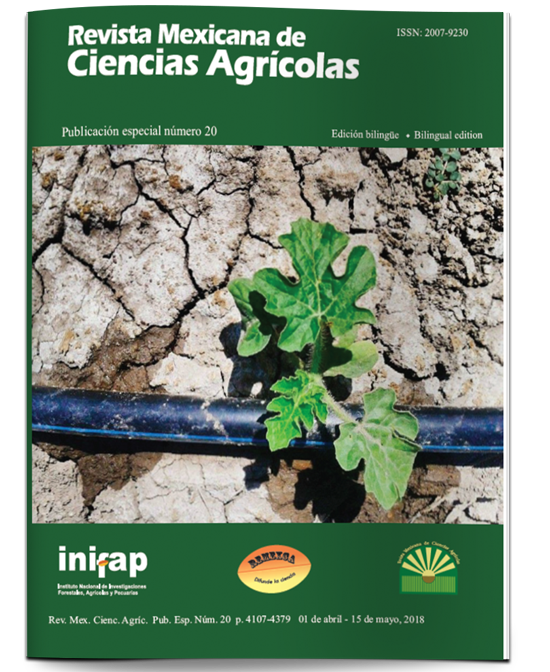Importance of potassium and ringing in the performance and quality of litchi fruit
DOI:
https://doi.org/10.29312/remexca.v0i20.997Keywords:
cultivate Brewster, alternative crops, crop nutrition, Sapindaceae.Abstract
The litchi (Litchi chinensis Sonn) is an internationally demanded fruit, grown in several states of Mexico with profitable prices, although with low yields. The objective of the research was to determine the effect of potassium and ringing on the yield and quality of the litchi cv Brewster fruit. A completely random block experiment was established, with a 3 x 2 factorial arrangement with 10 repetitions. Factor A consisted of three levels of potassium (300, 600, 900 g per tree-1). Factor B in two levels of banding in the branches (absence and presence), so that six resulting treatments were evaluated. The results indicate that the factors A and B, as well as their interaction, are determinant to increase the yield, although they affect little to the quality of the fruit. The levels of factor A and B that have the greatest effect on the yield, are 900 g of potassium and the presence of ringing respectively, so treatment six that combines both factors, records the highest performance. Low doses of potassium produce low yields, while ringing alone doubles it. The factors A and B present individual effects for the variables weight loss (PPF) and pH of the fruit, although the effect of the interaction only occurs for the pH. It is concluded that the contribution of 900 g tree-1 of potassium and the ringed in litchi trees, individually and combined positively affect the yield and little to the quality of the fruit.
Downloads
Downloads
Published
How to Cite
Issue
Section
License
The authors who publish in Revista Mexicana de Ciencias Agrícolas accept the following conditions:
In accordance with copyright laws, Revista Mexicana de Ciencias Agrícolas recognizes and respects the authors’ moral right and ownership of property rights which will be transferred to the journal for dissemination in open access. Invariably, all the authors have to sign a letter of transfer of property rights and of originality of the article to Instituto Nacional de Investigaciones Forestales, Agrícolas y Pecuarias (INIFAP) [National Institute of Forestry, Agricultural and Livestock Research]. The author(s) must pay a fee for the reception of articles before proceeding to editorial review.
All the texts published by Revista Mexicana de Ciencias Agrícolas —with no exception— are distributed under a Creative Commons License Attribution-NonCommercial 4.0 International (CC BY-NC 4.0), which allows third parties to use the publication as long as the work’s authorship and its first publication in this journal are mentioned.
The author(s) can enter into independent and additional contractual agreements for the nonexclusive distribution of the version of the article published in Revista Mexicana de Ciencias Agrícolas (for example include it into an institutional repository or publish it in a book) as long as it is clearly and explicitly indicated that the work was published for the first time in Revista Mexicana de Ciencias Agrícolas.
For all the above, the authors shall send the Letter-transfer of Property Rights for the first publication duly filled in and signed by the author(s). This form must be sent as a PDF file to: revista_atm@yahoo.com.mx; cienciasagricola@inifap.gob.mx; remexca2017@gmail.
This work is licensed under a Creative Commons Attribution-Noncommercial 4.0 International license.



